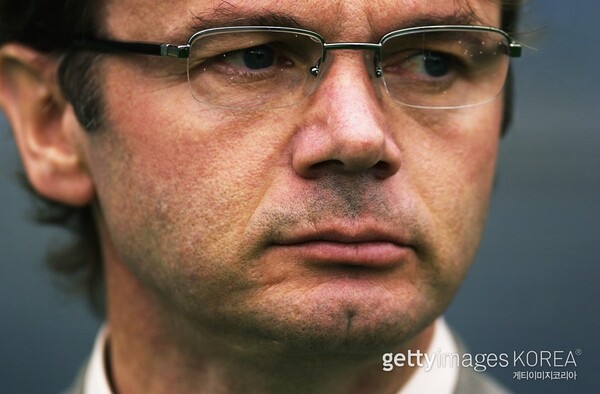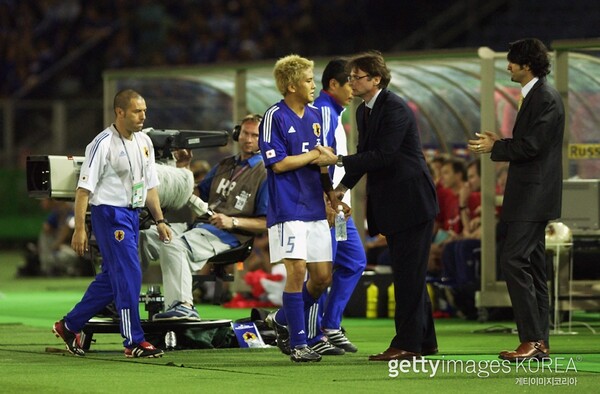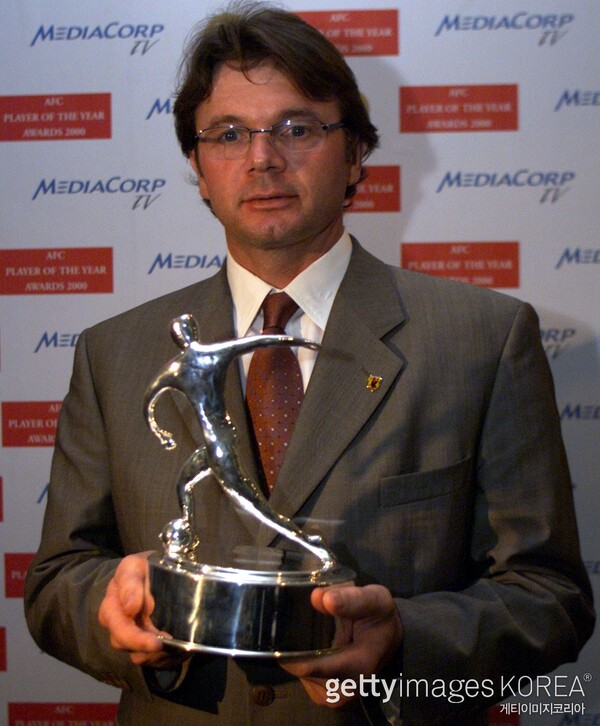
HAN, June @holazuni
founder@football-asian.com
Editor-in-chief
South Korea and Japan have led East Asian football. And football between South Korea and Japan is divided before and after the 2002 Korea-Japan World Cup. The two teams won the World Cup for the first time in the tournament and passed the group stage. South Korea's impact on the semi-final myth was greater than Japan's, which stopped at the round of 16.
Japan's achievements prior to the finals were also formidable. Japan finished runner-up at the 1999 FIFA World Youth Championship (now FIFA U-20 World Cup), the 2000 Sydney Olympics quarterfinals, the Asian Cup and the 2001 FIFA Confederations Cup.
If Guus Hiddink was the main player who changed Korean football, there was Philippe Troussier in Japan. After the 1998 World Cup in France, Head Coach Trusier, who co-operated Japan's under-20 team, under-23 team and senior team for the 2002 Korea-Japan World Cup, was selected to the semifinals, but was a key player in Japanese football's breakthrough growth.
16 years after the hot Korea-Japan World Cup. The heroes of the two Korea-Japan football teams entering their 60s are still on the scene. Hiddink recently took charge of the Chinese Olympic team, and Trucier headed to Vietnam. Vietnam's PVF Academy, which invests in fostering promising players with a long-term plan to advance to the 2026 World Cup finals, has appointed Trucier as its general manager and chairman of the technical committee.
After leaving Japan, Troussier, who also led France's prestigious club Olympique Marseille, who worked in countries with huge investments in Asia such as Qatar and China, has steadily experienced the development of Asian and world football at the forefront of the field. Troussier pointed to changes in Asian football and world football, as well as Korea-Japan football, after the Korea-Japan World Cup. Football Asian met with Trucier and heard about the development of Asian football.
-It has been a long time since the 2002 Korea-Japan World Cup. Hiddink, who was the coach of the Korean national team at that time, took charge of the Chinese Olympic team. You chose Vietnamese Academy over club football or national team.
After the 2002 World Cup, there was a family party. The president of the Korea-Japan Association, Hiddink and I attended a very friendly party. Last year, he met with the president of the Korea Football Association at the FIFA U-20 World Cup Final and greeted him gladly.
I knew Hiddink went to China. Even Hiddink, and in China go coach Lippi. I don't know if there will be synergy between each other, but I know it well. Head Coach Park Hang-seo, who worked with Hiddink, is now leading the Vietnamese national team. Coach Park has achieved a lot of success in Vietnam.
- Why did you go to Vietnam as a technical director, not as a Head Coach?
Because, I've always taken on the challenge. I did not weigh the level of challenge. Look at my career. I qualified Nigeria for the 1998 World Cup in France. And then I went to Burkina Faso. It was for the African Cup of Nations. I didn't set a destination for prestige or prestige. I didn't work for a reputation. In Vietnam, he will also lead the third division. What matters to me is what challenge this is, what people work with. Soccer is my passion, but I also want to feel that passion where I work.
Several Vietnamese officials contacted me last March and offered me the chairman of the PVF Academy's technical committee. There was something I wanted to be guaranteed, so I went to Vietnam to look around the facilities and heard the vision from official personnel. Based on my experience, I thought it was a good challenge. When I was in touch with Vietnam, I almost signed with Vitessel Kobe. Rakuten's president, Mikitani, who signed Iniesta, will not feel good because I eventually.
I thought I could use all the experience I had. If you're in Europe or as a coach, you have to focus on the results. Working outside the stadium allows you to message, help and advise people through experience. Of course, I miss high-level soccer and such competitions. But I've played more than 200 international matches. He has participated in two World Cups, the Olympic Games, the African Cup of Nations, the Copa America and the Asian Cup. And here we are. Participating in the World Cup is no longer my dream. How many coaches have experienced two World Cups? There will be as many as 10 people worldwide.
I work with people who believe in me and with people I believe in. It doesn't matter if it's part one or part two. Soccer is soccer. Of course, I recognise that it can be low level, but it also needs to be there. Every week, every day, all day long, passionate work. It's a real challenge. It's easy if it's on a high level. There is the best player in good condition. This is a low level, that's the key point to this.
- Southeast Asian football is growing rapidly. So you were interested?
Yeah, it's an area I didn't know before. I am glad to know this area. I saw real energy and potential. I saw the passion, pure potential of the Vietnamese people.That potential first turned out to be the runner-up to the AFC U-23 Championship last time. At that time, the reaction of Vietnam was amazing. It was like having a World Cup. Vietnam has this foundation and philosophy. Soccer is very popular in Vietnam. It's been like that for a long time. The popularity of the English Premier League and the European Champions League is also great in Vietnam. The ratings are also very high. There is a real soccer culture in Vietnam.
It is also true that the national team has been performing well recently. The 2026 World Cup will be expanded to 48 countries. Then it will automatically be a big opportunity for Vietnam. If 9 to 10 Asian teams can participate in the World Cup, I think Vietnam can go to the top 10 enough now. He's ambitious. My mission is to develop Vietnamese football and participate in the 2026 World Cup. It's a very interesting thing.
Getting the Vietnamese national team to the 2026 World Cup finals is a big challenge. It is a project that takes eight years. I can't say I'm working for eight years, but I'm aiming for eight years. To this end, it is good to explain to Vietnamese players first, work together, work as a team, and such a structure is good. We have the power. It has a vision and a structure and facilities. I think we can do it. Trust me. It will be a very interesting challenge.

Youth World Cup runner-up - World Cup Round of 16
"Comando camp training achievements."
The narrowing gap between world and Asian football is "due to a change in the standard of strict judgment"
- Although Vietnam has been doing well recently, there was still a power gap when competing with Asia's powerhouse, especially Korea. The homework is clear physically as well. How do you think it can be improved?
We don't need to compare with Korea or Japan. Korea and Japan are among the top two countries in Asia. We know that it is not at this level. However, everything is possible in one game. In the last Asian Games, we beat Japan 1-0. Vietnam beat Japan and passed the group stage as the first place. I watched the game. Everything is possible in one game.
We can't be on the same level as Korea and Japan right now. However, our target is not to raise the level of soccer to that of Korea and Japan. They do not compete on an equal level, but pass the Asian qualifying round for the World Cup. First of all, it is to narrow the gap by competing with teams from Thailand, UAE, Qatar, Uzbekistan and Iran.
If we compare with Japan, I know Japan well, so Vietnam and Japan are not much different technically. The big difference is that Vietnam has not realized until now that it can do it. Vietnam has a complex when playing with Iran, Japan and South Korea. If you think you won't win on your own before the game, you don't have a chance. I used to compare Vietnam to Mexico. Mexico is inferior to Brazil and Argentina in South America, but Brazil cannot win easily.
I don't think there's any need to compare strengths and weaknesses when describing Vietnam. The advantage of good technology? The weakness of being weak? No, identity is more important than that. Everyone has their own strengths and weaknesses. You have to believe in your identity. The soccer game is 11 to 11. Yesterday's truth may not be tomorrow's truth. You can do it if you get rid of the complex and trust yourself. That's the point. To make yourself believe. It's something I want to develop.
On the pitch, we can control the ball, pass it and run. They can play the same distance as Korea and Japan. You can do it if you play without a complex. It is different from playing in Japan and Korea, in foreign countries, in Vietnam and at home. That psychological aspect and the difference must be developed.
- South Korea and Japan did the same before the 2002 World Cup. I had a phobia of Europe and never won a World Cup. The two countries have changed completely since the World Cup. What and how did you change it then?
It's an easy problem, it's easy to change. Change does not come from coaching. It comes from how European clubs consider Korean and Japanese players. At that time, there was only one player in Japan who played in Europe. There are 25 to 30 players running now. European clubs are now beginning to think that there is football in Asia. South Korea also has about 13 players playing in Europe. These players automatically play high-level players in Manchester City, Manchester United, Germany and France, and work with high-level coaches. Then automatically let these players have a different attitude. Change these players. This process works again when they come to the national team. After playing for Bayern Munich and Olympique Marseille, he has a different attitude when he comes to the national team. Responsibility changes when you come back to the country.
Why did Japan develop? Because the players went to Europe. If you ask me how I developed Japanese soccer, I can say it's because about 20 players went to Europe. It was not developed by the Japan Football Association (JFA) or the Korea Football Association (KFA)'s technical policy. What KFA is doing? Enough already. Teach, educate, and these things are already strong. But what if I stay in Korea? Can't develop. If you go to Europe, you will develop further. The quality of Korea and Japan is 90% due to their advance into Europe. That's the only one.

- But wasn't there no European team when you were on the Japanese youth team and the Olympic team? At that time, I got results right away at the international competition. How could you change it in the short term?
It is a coaching issue. Of course there was a special process. It operated like a commando. It is a commando process in which 20 Comando gather to climb mountains day and night and attack people. Three or four weeks of camp training, team work, and psychologically armed. I manage players to trust their partners and trust each other. Tactically, of course, well prepared in terms of organization. Flat 3 is also used.
At that time, Japan, which was physically weak, was difficult to play challenging soccer. I paid a lot of attention to defensive tactics. But football is not judo. You can push your opponent out because you have a strong body, but you can also decide whether to block a person or a ball. Our players were too small and light to stop people. I had to defend along the ball. If you wait for the ball to come and fight, you lose.
I explained to the Japanese players. None of us can play for Juventus, Arsenal or Bayern. But together we can beat Germany, England and Italy. That was my message. If we have communication, organisation and discipline, we can win one game. And it produced a surprising result. We beat the United States, Portugal, Mexico and Uruguay at the World Youth Championship. I lost the final match against Spain. But it was good. If Spain had won, people wouldn't think it was a good competition. If we had won, we would have remembered less.
- How do you think football has improved over the past 15 years? Do you think tactical, strategic or physical developments have narrowed the gap with football powers?
It's not because of the physical that the gap has decreased. It is because of the referee's judgment criteria. At that time, we said we were stupid and too nive when we talked about Japanese football. FIFA's rule states that an opponent with a ball should not be touched, but in Europe, he used his elbow without caring. I dived from the penalty area. It was not like that in Japan. When I was preparing for the World Cup, I told the Japanese players to forget the FIFA rules when they meet the European team. FIFA rules make a fool of yourself and you won't win. The opponent will step on our feet, hit us, pull our clothes and provoke us. It should be prepared for that. Today a new standard is being applied. Can't tackle as roughly as before, can't touch the opponent like that, can't use people or elbows. Now it's soccer. It became more like soccer. Now I'm more focused on handling the ball.
So there is more opportunity for Japan. This is because the criteria for judgment have changed. The referee now holds the foul tighter. Simulation also provides a warning. So now football has the advantage of a team that handles the ball better. Japan is world class in that respect. Pass, control, shot, crossing, discipline... Look at the last World Cup match against Belgium. Japan destroyed Belgium. But missed in the last five minutes.
I spoke to JFA President Hamago. I was beaten again because of the knife. At that time, Japan did very well, and virtually destroyed Belgium. He dominated 85 minutes. The only problem was the last five minutes. Then Belgium recovered and Japan defeated. Before that, it was completely destroyed. Japan was fast, belligerent, good communication and creative. But I forgot it at the end. That's Japan. I made a stupid mistake. The game had to be controlled. But he kept attacking. Even though it was 2-0, he attacked. Then I lost by 2 to 3.
Because I didn't have enough experience. In particular, the coaches lacked such experience. This was a matter of experience for Japanese leaders. They tried to play soccer better than their opponents. Sometimes you need to play less soccer to win. But Japan did not know that. You have to know how to beat your opponent. You don't have to play soccer better than your opponent to win. Can you play soccer better if you play Barcelona? If you want to win, you have to find another way. Japan is improving the problem little by little, all its mistakes against Belgium stemmed from that. Still, Asian football is developing.
To Be Continued
